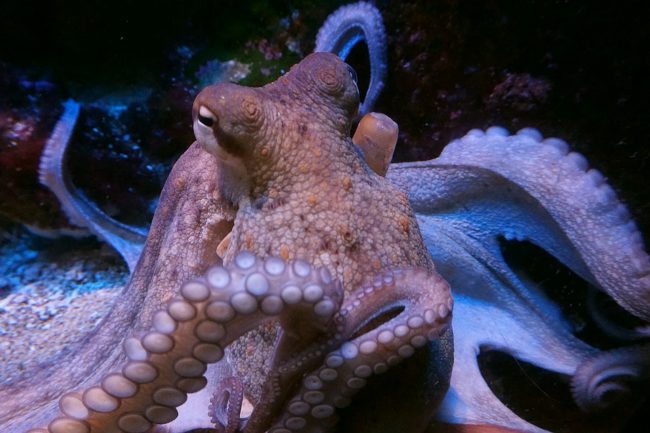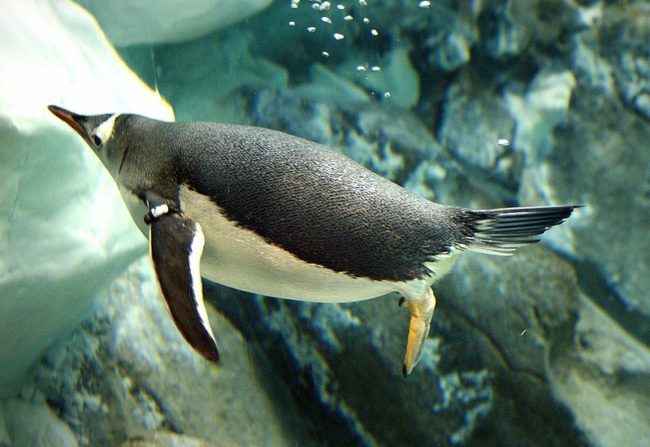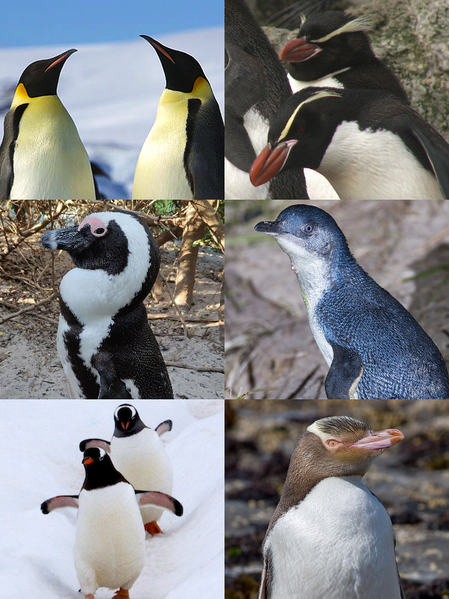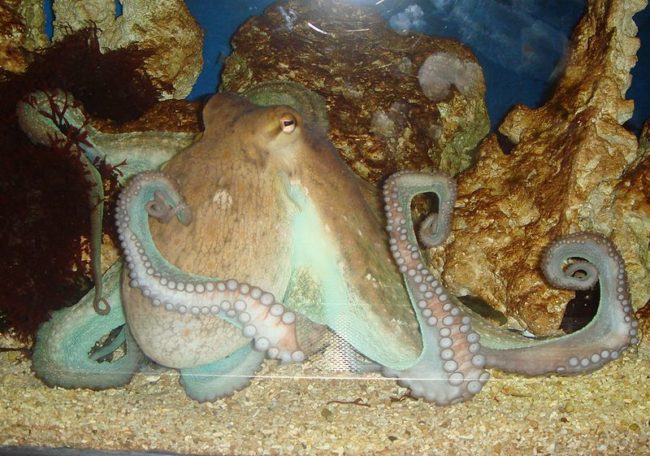It’s easy to say that by watching a penguin’s colony, we could learn a lot, such as from their hunting activities to eating their prey and how they get to their prey.
What has always concerned us and many others is what nutrition they get from the Octopus? If you think the answer is simple, it is not, as penguins pursue their prey in various ways.
Today, we are going to dive deep and understand – " Do Penguins eat Octopus?" Are you ready? Let’s go!
But first of all, let’s read about the Octopus.
Who are octopuses?

Octopus
An Octopus is a mollusk - like your typical garden smell. Octopuses belong to a unique class of mollusk, to be more specific. They are members of the cephalopod family.
Octopuses (or octopi, if you prefer) are cephalopods, invertebrates that include squid and cuttlefish.
Did you know – there is a high similarity between Octopuses and squids?
If you think that Octopus and squid are the same animals, you are not alone. They are cousins — both part of the Cephalopoda group — a group of marine mollusks including squid, octopuses, nautilus, and snails.
There are nearly 300 species of octopuses and squids in the global ocean. An enormous cephalopod is a giant squid, and the smallest is the pygmy squid.
The body of these animals are symmetrical, and they have no vertebrae, conspicuous heads, and arms, or tentacles that extend from their bodies.
Unlike nautilus and snails, octopuses and squid do not require a hard shell for protection due to other adaptations that they possess.
Octopuses have bulbous heads, large eyes, and eight handy beneficial arms. “Cephalopod” is Greek for “head-foot,” which is understandable, as their limbs are directly attached to their heads.
An interesting fact about octopuses is that they have three hearts to pump blood to the gills. The large heart also circulates the blood to the rest of the body.
Octopuses have nine brains. Connected to one of their brains are the eight arms.
It also has a mini-brain, the central brain, that helps the other brains act independently.
I was wondering if penguins eat octopuses?
Penguins are flightless birds, and they belong to the family of Spheniscidae. Penguins eat all kinds of seafood. However, their primary diet is fish. They also eat other aquatic animals such as krill, squids, crustaceans, and octopuses.
The British Antarctic Survey (BAS) team found gentoo penguins ate an approximately equal number of crustaceans, cephalopods such as Octopus, and fish between 1989 and 2010.
Penguins are carnivores with piscivorous diets; they get all their food from the sea and rely on clean, healthy seas for rich sources of nutritious prey.
Squids, Octopus, Krill, and 17 different fish species were among the prey species detected in all Penguin’s diets. But the question is, do penguins have teeth to bite down this 8-armed animal, the Octopus?
No, penguins do not have teeth like all other birds. Penguins have rearward-pointing tooth-like barbs on the tongue and end of the mouth. These do not help to chew the food but assist in swallowing their prey.
Do octopuses and penguins live in the same habitat?
Penguins are flightless birds that primarily inhabit the Southern Hemisphere’s southernmost areas.
Penguins are observed in the Southern Hemisphere, such as Antarctica, New Zealand, Australia, South Africa, South America, and the Galapagos Islands, to mention a few.
Every ocean on the planet and every coastline in Antarctica is home to octopuses.
Octopuses reside in coastal marine waters and spend a lot of time in small holes and cracks in rocks and coral. They tend to be solitary and territorial.
How does a penguin hunt octopus to eat?
Penguins feed in the sea. Most of the feeding occurs within 15.3 to 18.3 meters or 50 to 60 feet of the surface. The location of octopuses varies seasonally or even daily.
Penguins mainly rely on their eyesight when hunting. It’s a mystery how penguins find prey in the dark, at night, or in tremendous depth.
Some scientists hypothesize on this matter that penguins take the help of their bioluminescence (light-producing) abilities in hunting many sea octopuses, squid, crustaceans, and fish.
Penguins catch their octopuses with bills and swallow them whole while swimming.
They have also observed penguins across all species intentionally eating stones. They believe this is to assist them in lower buoyancy while hunting, allowing them to dive deeper and speed up the digestion of food in their stomachs.
A penguin has a forked tongue and powerful jaws to capture slippery prey.
Can we look at the Penguin’s hunting strategy?
- Coordinated Hunting
For Instance - African penguins forage in groups, tying schools of fish together on the surface into “bait balls” that they can sweep to capture prey. Their contrasting colors confuse the fish and allow the penguins to coordinate their attacks.
Some penguins go a phase further and can communicate with their other counterparts using sounds underwater in the sea.
Studies conducted by Nelson Mandela University have shown that king, Gentoo, and macaroni penguins all speak underwater.
- Seizing every chance
Penguins will continuously pursue the most calorie-dense food available, such as octopuses.
For example, penguins that dive unsuccessfully to catch Octopus will hunt for jellyfish on their way back to the surface.
- Stealing from other birds
Little Penguin has an easy strategy for finding fish - look up at the sky and see where the flying seabirds are gathering. It is a common trick used by our sea birds, the penguins, who follow Hurricane Petrel, Cape Cormorant, and Tern if possible.
However, other penguins benefit from this to an even greater extent. At the same time, Gentoo penguins are also cunning in this matter. Observed taking fish captured by other birds or penguins are the Gentoo penguins.
- Speed freaks
Penguins are often faster than their prey.
For Instance - Gentoo penguins are the record holders in speed. They reach a maximum speed of 40 km/h. The Adelie Penguin has one of the fastest strikes and can catch two krill in one second!

Gentoo penguins swimming
- Attacks from deep
Emperor penguins are the longest and deepest divers of all seabirds. They can reach depths of over half a kilometer or 25 minutes.
If they cannot find prey, they strike from the bottom instead, using their countershading camouflage to pass and trap smaller fish, crabs, or even small octopuses under the ice.
Is there any health benefit for penguins to eat Octopus?
The Octopus is a boneless sea creature. The Octopus has great biology that has spurred a large body of ongoing research.
It is known as the chameleon of the sea. An octopus can change shape and color, regrow its limbs, and has multiple hearts and bones.
The Octopus contains a high quantity of potassium, magnesium, and calcium. It is also a good source of Iron, Omega-3, Selenium, Copper, Vitamin-B12, and Carbs.
To find out what they obtain from these different nutrient sources, what Octopus contains, and what penguins gain from eating it.
Continue reading to find out everything you need to know about “How a Penguin Descended from an Octopus.”
- Omega-3
Octopus contains docosahexaenoic acid (DHA) and eicosapentaenoic acid (EPA).
Omega-3 fatty acids are essential for penguins to prevent heart disease and manage all walks of life.
- Iron
Octopus is naturally high in protein. It provides all the necessary iron for penguins.
Iron is a trace mineral, meaning penguins need it in a small amount each day. The mineral is an oxygen carrier and transports oxygen to cells, tissues, and vital organs. Iron also helps in the growth of cells.
For Instance - 8 milligrams of iron can be found in a 3-ounce piece of Octopus.
- Selenium
Octopuses provide a high amount of Selenium for a penguin’s health. This trace mineral plays a metabolism role during the digestion of the Penguin’s food. Selenium also acts as an antioxidant by liberating the Penguin’s body of harmful substances.
When free radicals scavenge through the Penguin’s system, these free radicals feed on the healthy cells in a penguin’s design and increase their risk of chronic disease.
Selenium protects these cells by neutralizing free radicals as an antioxidant. You need 55 micrograms of Selenium daily, reports the Linus Pauling Institute.
For Instance - Selenium is found in roughly 75 mcg in every 3-ounce meal of Octopus.
- Copper
Copper is an essential nutrient for the Penguin’s health. When combined with iron, it aids the formation of red blood cells in their bodies.
Copper contributes to iron absorption and helps maintain healthy bones, blood vessels, neurons, and the immune system.
Sufficient copper, provided from the Octopus, may also prevent cardiovascular disease and osteoporosis in Penguin’s health.
- Vitamin B12
Octopus provides penguins with their entire daily requirement of vitamin B-12. This vitamin is essential for metabolism, forming new red blood cells in their body, and supporting daily brain functions.
Having a 3-ounce serving of Octopus for penguins offers more than 30 micrograms of Vitamin B12.
- Carbs
A 100-gram dish of Octopus can provide 4-grams of carbohydrates while not being a significant source of carbohydrates.
Which species of penguins prefer to eat Octopus in their diet?
The large groups such as the Macaroni Penguins, Fiordland Penguins, Snare Penguins, Erect-Crested Penguins, Southern Rockhopper Penguins, Northern Rockhopper Penguins, Chatham Island Penguins, And Royal Penguins love to eat Octopus.

Species of penguins
These groups of penguin species primarily feed on krill and small aquatic animals such as squid, crustaceans, and octopuses from the Subantarctic Islands.
How often do penguins eat?
Most of the Penguin’s habitats have excessive food, whereas others don’t. They eat what and how much depends on their size, species, and other habitats.
Penguins must consume food in vast quantities because they have to survive and fast during the breeding and molting seasons. Food is essential to build up a thick fat layer.
While fasting, this fat layer provides them energy. Regularly an emperor penguin eats two to four kg per day. But before breeding and molting seasons, they may eat up to six kilograms per day.
How much does a penguin eat?
The amount of food penguins consume depends on the species, food availability, and the time of the year.
For Instance - An entire Adelie penguin population can eat 1,500,000,000 kilograms of krill, 115,000,000 kilograms of fish, and 3,500,000 kilograms of squids.
All penguins eat small fish, some more than others. For Instance - Only 4 percent of a chinstrap penguin’s diet consists of fish. But 90 percent of an emperor penguin’s diet is fish.
They catch and eat fish with powerful beaks and mouths on the back of their tongues. Penguins favor fish as they are opportunistic, and fish are easy to hunt. Penguins eat small schooling fish such as sardines, smelt, herring, and anchovies.
Do octopuses play a role in the food chain?
Octopuses are essential for all marine animal food chains. Octopuses provide food to animals that depend on them to survive, including eels, penguins, large fish, some birds, and dolphins. The food chain level also includes larger animals.
Copepods, larval crabs, and sea stars are all eaten by octopuses. Adult octopuses feed on crabs, clams, snails, small fishes, and even other octopuses.
What is the lifespan and size of Octopus?

Size of Octopus
Limited by reproduction, an octopus’s lifespan can range from males living only a few months after mating and female octopuses dying shortly after hatching.
The giant Pacific striped Octopus is an exception, as it can breed several times over a life span of about two years.
The common Octopus (Octopus Vulgaris) is 12 to 36 inches (30.5 to 91.4 cm) long and weighs 6.6 to 22 pounds. 3 to 10 kg.
The giant Pacific Octopus (Enteroctopus doflei) is the largest. They typically grow up to 16 feet (5 m) long and weigh around 110 lbs.
Are octopuses going to be extinct?
Octopuses are famous marine animals for their round bodies, bulging eyes, three hearts, and eight long arms.
They can be found in all the world’s oceans but are more common in tropical waters. They are incredible creatures playing an essential role in the marine ecosystem that deserve protection.
Since 2008, the annual global catch of Octopus has been around 350,000 metric tons, which is probably an underestimation because catches are, for the most part, underreported, especially in artisanal fisheries in adjacent Southeast Asia.
Octopus fisheries are in decline as measured by peak catch, and many octopus’ fisheries are now extinct.
Field marine surveys at 12 marine sites conducted by Endangered Species International in Southeast Asia between 2013 and 2018 showed a rapid decline or absence of octopuses due to overpopulation or habitat destruction.
How do penguins feed Octopus to their chicks?
The chick’s principal route of nutrition is always the same. The parent eats fish, krill, squid, or Octopus – captures and keeps the food for a time.
When the chick penguin is ready, the female Penguin spews the food into the penguin chick’s beak. The female penguin uses its beak to do the spewing. It serves as a spoon for placing the food into the baby penguin’s mouth.
Chicks need constant feeding throughout their development cycle to be happy and healthy.
Final Thoughts
Do penguins eat octopuses? Yes, they do. Octopuses contain a high quantity of almost all nutrients such as potassium, magnesium, calcium, iron, omega-3, selenium, copper, vitamin-b12, and carbs. Hence, most of the penguins eat octopuses.
The facts to get cleared with answers are indeed interesting. I hope you got the response to the factual discussion that happened one day with your friends or family where you left the space filled with sheepish smiles.
Image Source
Octopus by Alexandra_Koch / Pixabay License
Gentoo penguins swimming by Bernard Spragg. NZ / Public domain
Species of penguins by PaleoMatt / CC BY
Size of Octopus by ElinorD / CC BY
Reference
https://phys.org/news/2017-02-reveals-penguins.html
https://birdsflight.com/what-penguins-eat/
https://boardgamestips.com/tabletop-role-playing-games/do-penguins-eat-octopus/
https://blogpatagonia.australis.com/what-do-penguins-eat/
https://www.webmd.com/diet/health-benefits-octopus
https://www.thezoologicalworld.com/what-do-penguins-eat/
https://en.wikipedia.org/wiki/Octopus
https://www.aquarium.co.za/content/page/penguins-are-predators-too-motp10/
https://marinesanctuary.org/blog/what-is-the-difference-between-octopus-and-squid/
https://findanyanswer.com/what-does-the-penguin-eat
https://fossilpenguins.wordpress.com/2012/06/28/penguins-in-the-food-chain/
https://www.livescience.com/55478-octopus-facts.html
https://answerstoall.com/science/do-penguins-eat-octopuses/
https://www.endangeredspeciesinternational.org/news_june19.html
https://sciencing.com/penguins-their-food-4566074.html
https://www.penguinsinternational.org/2020/06/02/how-do-penguins-feed-their-chicks/